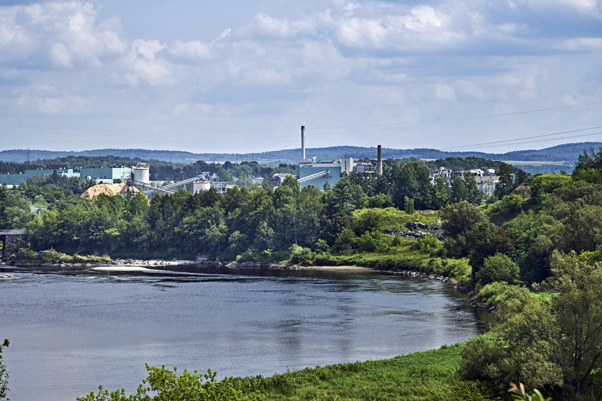Kruger to Diversify Two Québec Paper Mills into Specialty Niches
![]() Print this Article | Send to Colleague
Print this Article | Send to Colleague
Kruger Inc., Montréal, Qué., Canada, this week announced a $377.6 million transaction to diversify operations at its Brompton ,Sherbrooke, Qué., Canada, mill (first photo below), and Wayagamack, Trois-Rivières, Qué., Canada, mill (second photo below) into specialty niches, such as flexible food packaging, labeling, and digital printing. This major project, undertaken in partnership with the Government of Québec, will help to maintain more than 500 jobs in the Mauricie and Estrie regions.

The announcement was made in the presence of Philippe Couillard, premier of Québec; Dominique Anglade, minister of economy, science, and innovation, and minister responsible for the digital strategy; and Joseph Kruger II, chairman and CEO of Kruger, as well as Ministers Luc Blanchette, Julie Boulet, and Luc Fortin.
Kruger and the Government of Québec have formed a partnership by which Investissement Québec, acting as the government's agent, will grant loans and a loan guarantee totaling $59.8 million and acquire an equity participation of 37.5%, or $44.6 million, in the new entity Kruger Specialty Papers Holding L.P. The new entity comprises the assets of the Brompton and Wayagamack Mills, as well as the Biomass Ccogeneration Plant adjacent to the Brompton Mill.
To carry out this diversification project, Kruger Specialty Papers Holding will invest $107.5 million during the next three years to enable the Brompton and Wayagamack Mills to gradually reduce the production of some publication paper products that are in decline, such as newsprint and magazine paper, while accessing new markets that are on the rise around the world. Investments will be distributed as follows:
- Wayagamack Mill: $32.9 million;
- Brompton Mill: $47.5 million;
- Trois-Rivières Mill: $22.3 million; and
- Biomass Cogeneration Plant (Brompton): $4.8 million.

The mills' diversification strategy is based on the complementarity of the company's various operations, which is why the project calls for investments in the Biomass Cogeneration Plant next to the Brompton Mill and in the thermomechanical pulp mill at the Trois-Rivières Mill, which will supply the Brompton and Wayagamack Mills with raw material.
The amounts invested will be used to acquire new production equipment, modify existing equipment, make technical improvements to boost productivity, and for various energy efficiency measures.
The new Kruger Specialty Papers entity will supply products that are in high demand due to changing market trends around the world, specifically increased demand for sustainable packaging and the growing popularity of e-commerce. New specialty products include food packaging paper, labeling products (backing paper), and coated paper for digital inkjet web presses to print mass-circulation catalogues and flyers that can be customized for targeted mailings.
By the end of the project, the Brompton Mill will focus exclusively on specialty products and therefore will no longer manufacture 200,000 metric tons of newsprint annually.
The innovative specialty papers developed by Kruger will offer several competitive advantages, including the use of cellulose filaments (CF). This new-generation biomaterial is Kruger's proprietary strengthening additive that is manufactured at the world's first CF plant built by Kruger in Trois-Rivières in 2014. Tests conducted by the company have shown that adding CF helps to make products stronger, lighter, and more sustainable.
Founded in 1904, Kruger is a producer of tissue products, 100% recycled containerboard products, corrugated packaging, publication papers, specialty papers, renewable energy, cellulosic biomaterials, and wines and spirits. The company is also a leader in paper and paperboard recycling in North America. Kruger has facilities in Québec, Ontario, British Columbia, and Newfoundland and Labrador, as well as in Tennessee, Maine, New York, Virginia, and Rhode Island in the U.S.


